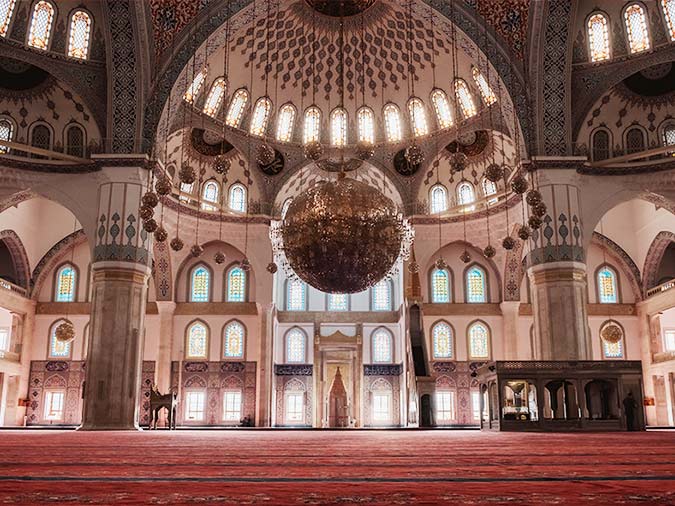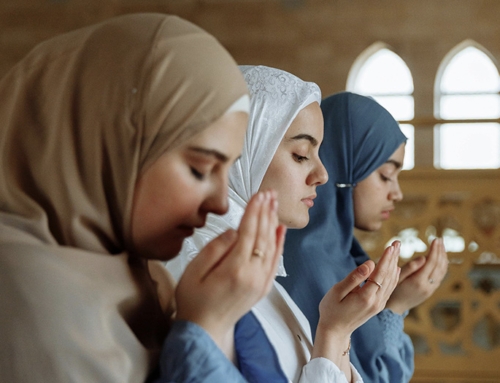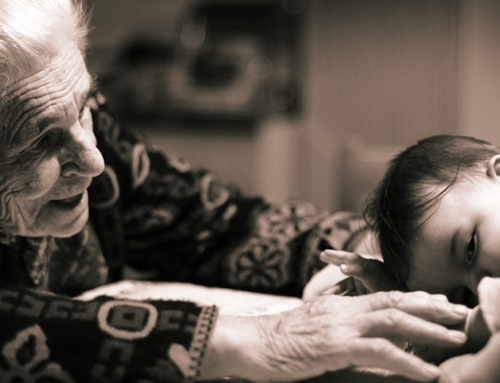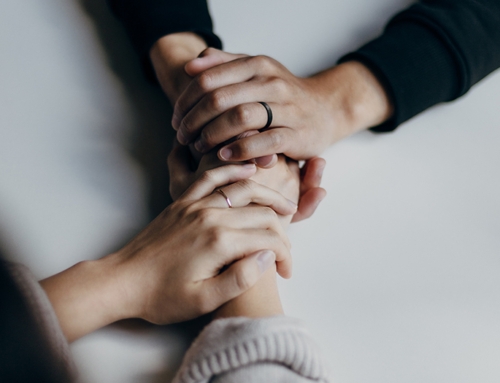By: Melissa Barreto
New to Islam? Here’s What to Know Before Visiting a Mosque
Congratulations! You recently accepted Islam as your way of life and you’re excited to start attending the mosque, or masjid in Arabic (there’s no time like the present to start adding to your Muslim vocabulary bank).
Before you head out the door and randomly show up at your local mosque, there are a few things it might be helpful to know first.
1. Every Mosque is Different
While Islam is one religion, Muslims, and the mosques that they attend, come in many shapes, sizes, cultural backgrounds, and personalities.
Some mosques are large and built to serve as community hubs that offer many different types of services, programs and events. Other mosques are tiny and only function as a space to pray during the times of the five daily prayers. They may not even be open if you were to pass by during any other time.
Some mosques were established and are predominantly attended by individuals belonging to one ethnic group who all share similar language, culture, and social expectations. Other mosques are filled with an amazingly diverse population and are used to catering to people with diverse backgrounds.
Some mosques are very active in outreachand interfaith work and because of that they are well-versed in convert journeys as well as how to help new converts continue their education and transition to life as a Muslim. Other mosques…not so much.
Some mosque communities can be very conservative and implement strict rules for attendance, such as completely separate entrances and prayer spaces for men and women, or requiring that all women wear a hijab (head scarf) in order to enter. Other mosques are more relaxed.
Lastly, some mosques can have slightly different practices because the community adheres to a minority sect, such as Shia. Other mosques are established and attended by Sunni Muslims who make up the majority of Muslims worldwide.
I know this is a lot to take in as a new Muslim, but trust me when I say that it’s better to read about it here and know that these differences exist than to show up unaware and be confused or end up having a difficult time. Best practice is to think about what exactly your needs are and call the mosque ahead of time to ask about the kinds of services, setup, and programming they have to accommodate you. You can even ask the mosque for a guided tour or request a meeting with the Imam (spiritual director).
2. Don’t Be Shy to Advocate for Yourself
Muslims are not mind-readers. Unless you tell someone that you’re a new convert there won’t be any clear or obvious way for another Muslim to know that you are and offer help.
As nerve wracking as it may be, it is vital that you speak up for yourself when you first start attending the mosque. Introduce yourself to members of the community, let them know you just converted and it’s your first time visiting a mosque. Make them aware of what you don’t know and/ or what help you need. Are you looking for a Quran in English? How about one in Spanish? Do you need a schedule of mosque classes and activities? Would you like someone to show you how to pray? Maybe you’re interested in hearing more about the weekend school for your kids? Has your family kicked you out of the house and you’re in need of emergency lodging for the night?
Once people know who you are and what your situation is, more often than not they will be happy to help you in whatever way they can.
3. You May Be Asked to Publicize Your Shahada
Once a mosque gets wind of a new convert in the community, the resident Imam may ask for you to declare your shahada, testament of faith, publicly to the community, especially if your acceptance of Islam has not been previously witnessed by other Muslims.
Doing this serves two main purposes:
- It announces to the community that they have a new brother or sister in faith to welcome and support.
- It acts as a spiritual boost for other Muslims to witness new people coming into Islam.
Agreeing to this often means standing in front of the congregation after one of the daily prayers and repeating your shahada aloud. Then a few minutes are given for the community to welcome you with warm smiles, friendly handshakes, and loving embraces. Joyful tears are often shed and many will recite heartfelt prayers for your wellbeing.
It can be a beautiful and spiritually uplifting experience for converts, especially if up until this point you have been alone in your journey coming into Islam. It can also serve as an opportunity to meet other Muslims and exchange numbers with some of the more active community members who may be available to provide assistance for you down the line.
With that said, publicizing your shahada in this way is not required in order for your Islam to be valid and if you would rather pass on it, for whatever reason, feel free to politely decline the invitation. When I said my own shahada, I chose to do it quietly with only one other person as my witness because I simply wanted to savor it as the deeply personal and private moment that it was for me. The friend who witnessed it for me went later and announced my conversion to the community on my behalf without me having to repeat my shahada.
The choice is entirely yours to make as you feel comfortable.
4. On Interacting with the Opposite Gender
Islam encourages maintaining a level of respectful distance and formality between unrelated men and women as a way of guarding the modesty of both individuals. Because of this, Muslims tend to be more conservative when it comes to men and women mingling together.
While you’ll definitely find Muslim men and women working together in the mosque and community to accomplish certain tasks and goals related to learning, work, community service etc, what you generally won’t find are men and women hanging around to simply hang around together. Conversations can be warm and friendly, but also be short and to the point.
Limitations on physical contact between unrelated men and women are also encouraged so please don’t take offense if a Muslim of the opposite sex chooses not to:
- Give you a hug, kiss, or handshake when being introduced;
- Sit or stand directly next to you when there are other spaces available;
- Be alone with you in a room, especially behind closed doors or when other people are not around;
- Serve as your study buddy, or any other kind of buddy, and refers you to a Muslim of the same sex instead.
5. A Few Quirky Housekeeping Items
Depending on the kind of faith and house of worship you are transitioning from, the inside of a mosque may look different than what you’re used to. As I mentioned at the beginning, every mosque is different but there some general things they all tend to have in common:
Image-Free Decorating
One of the first things I noticed at the mosque was that it was free of pictures. Nowhere did I see an artistic interpretation of God, the Prophet, or even a highly respected religious figure. Later on I learned that creating such images in Islam was not allowed.
Instead, most mosques are adorned by other means–through the use of beautiful architecture, painted or engraved verses of the Quran along the walls, or the simple use of color in the carpets, walls, and glass.
Sitting in the Masullah (Prayer Space)
The first time I visited a mosque, I was wowed by the mosque carpets. Boldly colored, ornately decorated, super soft, and smelling faintly of incense. It kind of makes you want to lay down and roll around all over them. And it’s a good thing too because you can expect to spend a lot of time sitting on the floor.
A mosque doesn’t have benches or pews, and chairs are usually reserved for the elderly or those with physical conditions that make floor sitting difficult. We sit on the floor before the prayer starts and after the prayers finish. We also sit on the floor when we attend classes, lectures or circles for Qur’an reading. You may even spy some Muslims laying down to catch a nap on the floor if they’ve had a long day (that’s how comfy the carpets are!).
Shoe Racks
When you visit the mosque and enter the prayer area, you’ll need to remove your shoes. The removal of shoes is not a religious obligation, but one done simply to keep the carpet clean. When we pray, and bow down into prostration, our faces are touching the floor. No one wants to touch their face to the floor where other people have dragged the dirt from the bottom of their shoes.
Some common areas may be shoe friendly, but the prayer space will definitely not be. Your shoes will go on the rack as you enter and you can grab them again when you go out.
Watering Cans in the Bathrooms
This may be one of the most curious housekeeping items for new converts at the mosque.
When you enter the bathrooms, be you male or female, you will likely find what looks like a small plastic watering can for plants. In short, it acts as a bidet and is there to assist you in washing yourself after you use the bathroom. Some mosques may alternatively have actual bidets installed in the form of small hoses attached to the wall or side of the toilet.
Cleanliness is highly encouraged in Islam, for our spaces as well as our bodies. Washing with clean water is a part of that. If you need more detailed information on how to do that, definitely ask a staff member of the same sex for help.
Find a Mosque
If you need help finding a mosque near you, fill out this form and a volunteer from the Why Islam team will get back to you.
Melissa Barreto is a home educating mother of five and the Co-Founder of Wildflower Homeschool Collective, a homeschool organization based in Northern New Jersey.
Got Questions?
We have Answers. Get in touch now.








